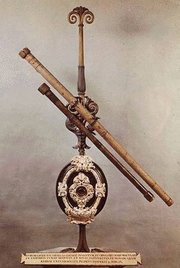Last updated on March 16th, 2020
In Galileo Galilei’s honor
22. America launched an unmanned spacecraft named “Galileo” in the memory of this great astronomer. The spacecraft was tasked to study Jupiter and its four moons.
23. Europe developed a global satellite system of civil navigation and named it “Galileo” in honor of the great scientist of the 17th century.
Facts about Galileo’s other inventions
24. Galileo is also credited with the invention of the military compass, which was used as a calculating device between the 16th and 19th centuries. In addition to the compass, he also invented a thermometer.
25. Galileo also established that in the absence of air resistance, gravity accelerates all objects equally, irrespective of their masses.
26. Galileo was a supporter of “heliocentrism”, an astronomical model where the Sun is the center of the solar system with the Earth and other planets revolving around it.
27. Galileo was the first person to reveal that the Milky Way was composed of stars.
28. Newton’s first law of motion was based on Galileo’s formulation of the concept of inertia. Galileo stated that an object in a state of motion possesses an “inertia” that causes it to remain in that state of motion unless an external force acts on it. Because of this, it is easy to understand why Galileo was called “the father of modern physics” and “the father of modern science.”
29. Galileo’s work, which was opposed by the church during his lifetime, was recognized by the church after his death. In the modern era, 20th century Popes Pius XII and John Paul II made official statements of regret for the church’s treatment of Galileo.
30. Galileo was against Kepler’s theory that the moon caused tides on the Earth, and instead believed that they were due to the rotation of Earth. Surprisingly, Kepler supported Galileo for his work by publishing letters in his support at the time.
31. During his final years when he was blind, Galileo quoted: “Alas! Your dear friend and servant Galileo has been for the last month hopelessly blind; so that this heaven, this earth, this universe, which I by my marvelous discoveries and clear demonstrations had enlarged a hundred thousand times beyond the belief of the wise men of bygone ages, henceforward for me is shrunk into such a small space as is filled by my own bodily sensations.”
32. His book, Sidereus Nuncius or The Starry Messenger, was first published in 1610, making him famous.
Interesting facts about Galileo’s telescope

33. Galileo developed a crude refracting telescope at first.
34. His telescope was initially able to magnify only 8x. However, he soon refined it to provide 20x magnifications.
35. The telescope had a convex objective lens and a concave eyepiece in a long tube.
36. His telescope had a very narrow field of view. With it, he could only view about half the width of the moon.
37. He used his telescope to study the moon quite effectively. He concluded that the moon is uneven, rough, and crowded with depressions and bulges. He could also calculate the heights of the mountains on moon by measuring the lengths of their shadows and applying geometry.
38. Another interesting fact about Galileo is that Isaac Newton was born the same year Galileo died. Newton did a lot of work on the motion of bodies, and took Galileo’s ideas forward, presenting to the world the fundamental equations and data we use in our daily lives.
39. Because of church opposition regarding his promotion of the theories supporting heliocentrism, Galileo had to adopt a principal of a “double truth,” publicly disowning his convictions, while remaining privately and intimately convinced of the truth in his theories.
40. Galileo’s book, the Dialogue Concerning the Two Chief World Systems was banned by the church at that time. However, the ban on the book was lifted in 1835 by the church some 200 years after its original publication.
Famous quotes by Galileo Galilei
1. “I do not feel obliged to believe that the same God who has endowed us with sense, reason and intellect has intended us to avoid their use.”
2. “You cannot teach a man anything; you can only help him find it within himself.”
3. “All truths are easy to understand once they are discovered; the point is to discover them.”
4. “By denying scientific principles, one may maintain any paradox.”
5. “I have never met a man so ignorant that I couldn’t learn something from him.”
6. “In questions of science, the authority of a thousand is not worth the humble reasoning of a single individual.”
7. “Passion is the genesis of genius.”
8. “Philosophy is written in that great book which ever lies before our eyes — I mean the universe — but we cannot understand it if we do not first learn the language and grasp the symbols, in which it is written”
9. “They seemed to forget that the increase of known truths stimulates the investigation, establishment and growth of the arts; not their destruction.”
10. “Thought is the most pleasing ability granted to human kind.”
Related: Interesting facts about Henry Ford
Galileo Galilei – Quick facts
| Born | 15 February 1564 Pisa, Duchy of Florence, Italy |
|---|---|
| Died | 8 January 1642 (aged 77) Arcetri, Grand Duchy of Tuscany, Italy |
| Nationality | Italian |
| Languages Known | Italian |
| Age at the time of death | 77 years |
| Field of Work | Astronomy, physics, engineering, natural philosophy, mathematics |
| Known for | Kinematics Dynamics Telescopic observational astronomy Heliocentrism |
| Contributions | Science and Physics |
